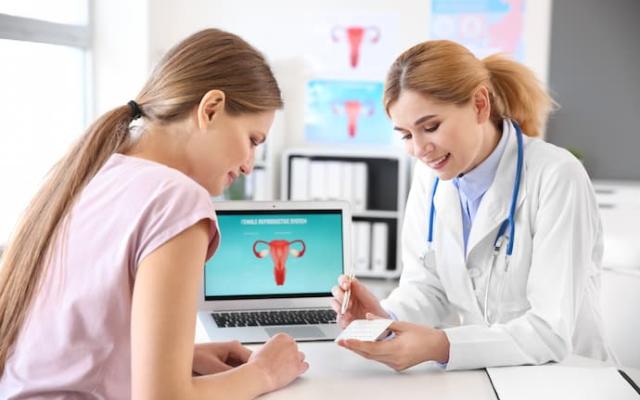
Reading time: 7 minutes
Globally, cervical cancer is one of the most common types of cancer in women. That is why prevention, awareness and knowledge of the disease are very important in this article. Here, we will look at the symptoms of cervical cancer, from the most common ones to the more unusual ones.
By doing so, we can help you to recognize the symptoms and subsequently see a specialist as soon as possible. Your doctor is also able to detect cervical cancer through a simple Pap smear when you have regular gynecological check-ups.
INDEX
Cervical Cancer Prevention
Yes, cervical cancer can be prevented. Certain measures can be taken before the cancer appears that can delay it or stop it from developing altogether.
The most effective way to prevent cervical cancer is to get the human papillomavirus (HPV) vaccine and to have all the tests that are used for detecting cervical cancer.
Another form of prevention is regular visits to the gynecologist and regular Pap smears.
Limiting the number of sexual partners is also a form of prevention, given that HPV is often transmitted through sexual intercourse.
However, what is absolutely essential for all gynecological cancers, including breast cancer, uterine cancer and vaginal cancer, is raising awareness because there is a high survival rate if they are detected in time.
Primary Prevention
Primary prevention means preventing cervical cancer from occurring in the first place. Knowledge about sexually transmitted infections (STIs) and sexually transmitted diseases (STDs) is crucial. It is also important to use condoms as a barrier against STIs and STDs whenever possible.
The human papillomavirus (HPV) vaccine is the best method of prevention. It is usually given to girls aged 13-14 years old to prevent transmission of the virus through sexual intercourse. It is also given to boys, as the virus can cause cancer of the penis and anus in men. This way there is no risk of transmission.
Secondary Prevention
Secondary prevention focuses on very early detection, which in the majority of cases prevents the cancer from spreading and stops the first symptoms of the disease.
For this reason, it is not only necessary to go for a gynecological check-up when symptoms appear, but it is also necessary to do so on a regular basis. Thanks to Pap smears abnormal cells (dysplasia) can be detected at a very early stage.
Cervical Cancer Prevention Day
March 26 is Cervical Cancer Prevention Day. The aim of this day is to inform and raise public awareness. A number of associations offer talks, distribute informative leaflets and even provide online resources to improve access to information.
Cervical cancer awareness and prevention are key, given that the five-year survival rate for cervical cancer is high when it is detected early.
However, it is important to keep in mind that age plays an important role, as younger women have a higher survival rate.
What are the symptoms of cervical cancer?
There are many different symptoms of cervical cancer. Some do not go beyond mild discomfort, so they are often neglected. Others are more unusual and may stand out but could be related to other diseases.
At the first sign of symptoms, you should make an appointment with a gynecologist.
The most common symptoms of cervical cancer
Many symptoms can indicate that a woman has cervical cancer. However, most of them may seem insignificant and go unnoticed or be mistaken for other conditions or diseases such as vaginismus or irregular menstrual cycles. So, here are the most common symptoms:
- Vaginal bleeding after penetrative sex: in many women, this is the first symptom of cervical cancer. This does not necessarily mean that penetration is painful, but traces of blood may appear after sexual activity. Many women downplay this until the bleeding happens every time.
- Pain during arousal and/or intercourse: some women may also experience pain during penetrative intercourse (regardless of whether or not they have bleeding). This may occur during intercourse or even moments before, when the walls of the uterus and vagina are preparing for penetration.
- Vaginal bleeding after menopause: some women begin to experience the first symptoms of menopause when they still have bleeding. This is relatively common and you should not worry. However, if you have had no vaginal bleeding for years and it appears again, you should consult your doctor as soon as possible.
- Bloody and watery vaginal discharge: another possible symptom is that vaginal discharge may appear bloody. This discharge is often more liquid and less viscous than usual, although this varies depending on the phase of the menstrual cycle.
- Vaginal discharge with a very intense odor: another possible symptom is if vaginal discharge maintains the same viscosity and color, but its odor has become more intense or even foul-smelling.
- Vaginal bleeding between menstrual periods: if 5, 10, or 15 days after the end of your period you are bleeding again, you should see your gynecologist. In most cases, this is due to an irregular cycle, but sometimes it is also one of the most common symptoms of cervical cancer.
- Menstrual bleeding periods that exceed 6 or 7 days: there are women who since their first menstruation have menstrual bleeding periods that last a week, so if that is your case you should not worry. But if your periods lasted less than a week and now exceed 9 or 10 days of bleeding, you should see a specialist, because this could be a symptom of cervical cancer.
If you are experiencing one or two of these symptoms and they have also appeared on more than one occasion, you should consult a doctor as soon as possible or make an appointment with a gynecologist. Early diagnosis is crucial.
Symptoms of advanced stage cervical cancer

Occasionally, cervical cancer can spread to other areas of the body. Some of the symptoms that cervical cancer may have spread are:
- Abdominal pain: this can be sporadic or continuous. In some women, it is a very intense pain and in others, it may be only mild discomfort.
- Difficulty or pain when evacuating: this can even cause sores or constipation which may last for several days.
- Bleeding from the rectum: traces of blood may appear with bowel movements.
- Persistent swelling in the legs: however, please bear in mind that from the age of 60 or 70, other complications may cause swelling in the legs, so this is not a definitive symptom.
- Back pain: the back pain that is experienced due to a symptom of cervical cancer is different from that which comes from injuries, poor posture, or degenerative bone diseases.
- Feeling tired: this may not necessarily mean you need more hours of sleep; however, it is likely that you will lack energy or have little interest in doing activities that involve exercise or physical activity.
It is important to keep in mind that all of these symptoms can also be symptoms of other complications or illnesses. None of them is definitive proof of advanced-stage cervical cancer.
It is important to consult a specialist and report these and any other symptoms.
When to see a specialist?
All women from the age of 18 years old or the moment they start having sexual intercourse on a regular basis, should see a gynecologist at least once a year. This is important to detect gynecological cancers and sexually transmitted diseases. Thanks to this, many gynecological cancers are detected before the patient shows any symptoms.
In cases where the patient has not seen a gynecologist for years, seeing one at the first sign of any symptom is essential, especially if more than one symptom appears at the same time or if any of them appear frequently.
Gynecological check-ups

At Bupa Salud, our gynecology consultants are available for routine check-ups and we offer preventive care for cancers such as cervical cancer.
In addition, we can provide you with information on prevention systems and how to detect symptoms.
Nowadays, the number and type of gynecological cancers are on the rise, as is the case with breast cancer. Therefore, early detection is key.
Cancer treatments
We also offer a range of cancer treatments and in the case of gynecological cancers, our team of experts and researchers will be on hand at all times to make sure you feel cared for and informed. We will always provide you with the necessary information and help you make the best decisions to guarantee your well-being during this complicated process.
The causes of cervical cancer
The causes of cervical cancer are not very clear, each woman and each case are different. However, it is directly related to HPV, which is considered the leading cause. Hence the importance of vaccination, and the practice of safe sex by using condoms or having sex only with people whose sexual health is known to us.
The other cause, of course, is genetic and hereditary. We can inherit a genetic predisposition to mutations in the DNA of cells in this area of the body, and also be infected by other sexually transmitted infections that contribute to the development of cervical cancer. Also, smoking increases the chances of developing cervical cancer.
In summary
There are many symptoms of cervical cancer and it is a good idea to be aware of all of them, because if detected early, the five-year survival rate is very high, especially in young women. For this reason, going to see your gynecologist at least once a year and getting a Pap smear is a must.
Knowledge of the symptoms and prevention, such as the HPV vaccine, also play a key role.
Sources:
- Cáncer del cuello uterino (Cervical cancer)
- Factores de riesgo del cáncer (Cancer risk factors)
- Pruebas para los trastornos ginecológicos (Tests for gynecologic disorders)
- Introducción a los tumores malignos del aparato reproductor femenino (Introduction to malignant tumors in the female reproductive tract)
- Symptoms: Womb (uterus) cancer